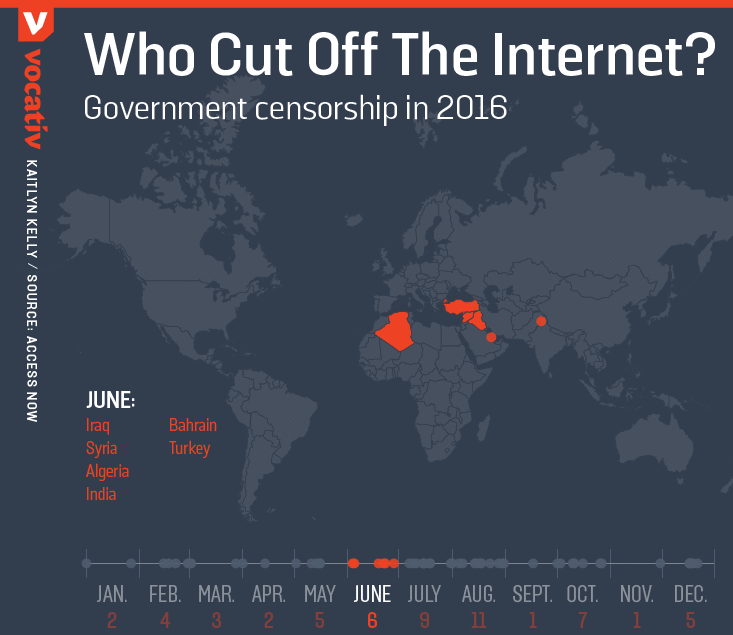 INFRA
INFRA
 INFRA
INFRA
 INFRA
INFRA
The Internet is becoming more accessible even in the remotest parts of the worlds. But with that prevalence comes more aggressive attempts to suppress it. Throughout 2016, governments around the world attempted to shut down the web on more than 50 occasions.
Governments shut off access to the internet for a variety of reasons, including making attempts to influence the outcome of elections and stifle internal dissent, reported Access Now, an internet policy advocacy group that runs the #KeepItOn campaign. As part of that initiative, Access Now documents all known instances where governments shut down the internet, either for all or part of the country, or block specific communication methods.
Deji Olukotun, senior global advocacy manager at Access Now, told the Inter Press Service that Uganda’s President Yoweri Museveni was one such guilty party, shutting off access to the web and social media sites such as Facebook and Twitter on the morning of that country’s general elections.
Meanwhile in Gambia, the government of incumbent President Yahya Jammeh closed down all internet access and international call services on the day before the elections. President Jammeh later declared victory after initially conceding the election to his rival Adama Barrow, and looks set to continue his 22-year rule over the small African nation.
Several other African nations shut off the Internet over the course of last year, including Chad, Congo-Brazzaville and Ethiopia. In the case of the latter, Access Now said officials had cut off Internet several times in 2016 in an effort to cover up the alleged deaths of hundreds of anti-government protesters.
Other nations have interfered with Internet access for less malicious reasons. For example in Iraq, authorities there decided to block the Internet on key dates in order to prevent students from cheating in national exams. The country has done this in previous years too, Access Now said.
But shutting down the Internet comes at a price. Access Now cites a recent paper from the Brookings Institute, which revealed that the cost of Internet shutdowns exceeded $2.5 billion in 2015.
The good news is that Internet shutdowns are still relatively uncommon events in most countries. Indeed, most nations are spending huge amounts of money to build up their Internet infrastructure. On the whole most governments want to expand Internet access,” Olukotun said. “Many of them see it as an opportunity to participate in the global economy and be competitive.”
In order to prevent governments shutting down the web for malicious purposes, Olukotun suggested the onus is on Internet service providers to take a stand. “Telecommunications companies can push back on government orders, or at least document them to show what’s been happening, to at least have a paper trail,” he said.
Of course that may not always be possible in corrupt regimes where the ISPs may well be owned by individuals connected with the government. In such cases, Olukotun said that international agencies such as the International Telecommunications Union, the United Nation’s agency for information and communication technologies, could do more by issuing statements condemning such incidents.
Support our mission to keep content open and free by engaging with theCUBE community. Join theCUBE’s Alumni Trust Network, where technology leaders connect, share intelligence and create opportunities.
Founded by tech visionaries John Furrier and Dave Vellante, SiliconANGLE Media has built a dynamic ecosystem of industry-leading digital media brands that reach 15+ million elite tech professionals. Our new proprietary theCUBE AI Video Cloud is breaking ground in audience interaction, leveraging theCUBEai.com neural network to help technology companies make data-driven decisions and stay at the forefront of industry conversations.